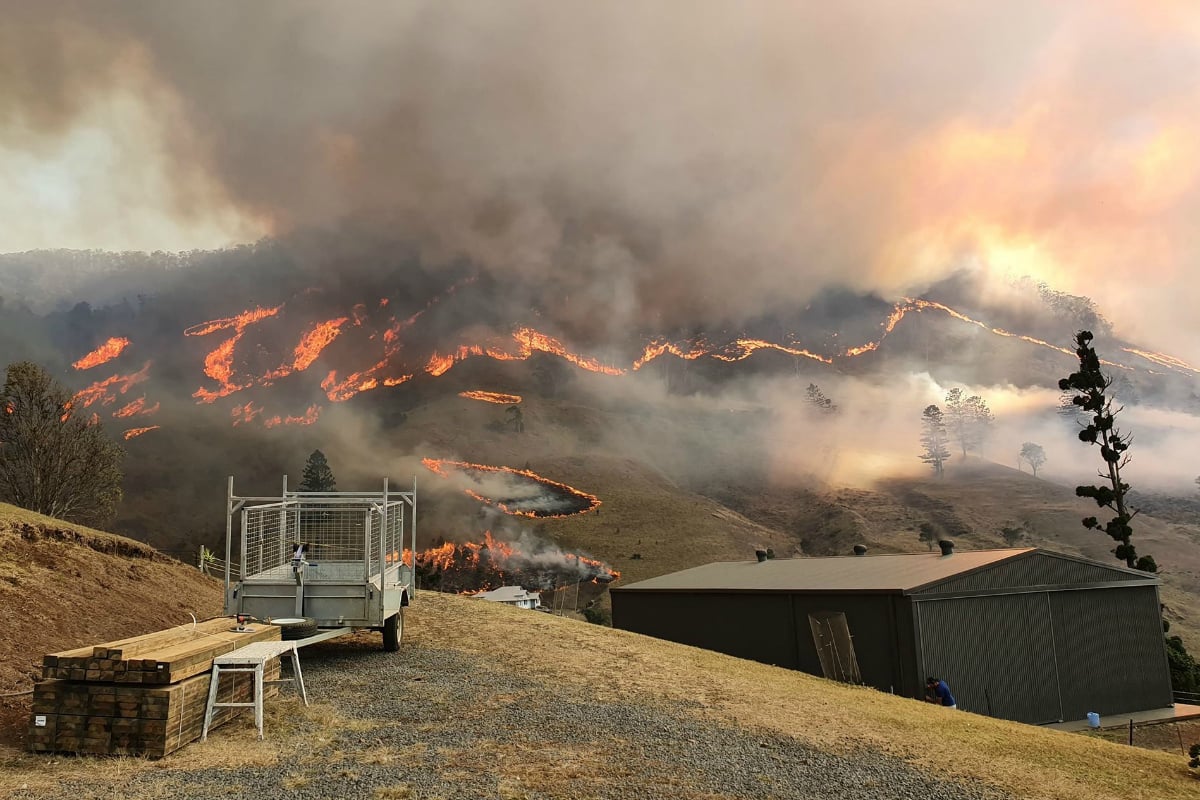
A corner of our country is burning right now. More than 130 fires are being fought across Queensland and New South Wales in what is the worst start to the bushfire season ever recorded in Australia.
The otherwise idyllic Sunshine Coast has been among the hardest hit. Residents of Peregian Beach watched from behind police road blocks on Tuesday, as thick plumes of black smoke billowed into the glowing orange sky over their community.
Only today are the more than 5000 evacuated residents beginning to return to their homes, as firefighters continue their war against the blaze.
Across the state, some 519 bushfire community warnings have been issued in the past eight days, 17 homes have been lost and dozens more damaged. And authorities are warning us all to brace for more.
It’s only September.
But the reality is that there was an emergency far before the first embers sparked this year. We are — as scientists have been warning for decades — in the midst of a climate emergency. And the destruction caused by these blazes only supports demands on our Federal Government to acknowledge that.
A terrifying trend.
In this arid country of ours, the approach of summer has always brought with it the sound of sirens and the acrid smell of smoke. But in recent years, fire seasons are beginning sooner and lasting longer.


Top Comments
Should we call it a bigger climate emergency than when we had major September bushfires in NSW (85) or Tasmania (06)?
Yes. Because those events were 20 years apart. We now have severe fires in most states every year.
You don't get it. You just.....don't get it. It is about the fire season starting in months that weren't thought possible previously. It is about the increasing regularity, the severity. Hence the term climate change.
I mentioned just two other examples of significant bushfires that started in the month of September, same as the climate alarm story here. You are just desperate to find evidence to support your theory, rather than look at all the data points and reach a sensible conclusion.
The fires were lit by children. Is climate change affecting their behavior?
No, but prolonged drought does mean higher fire risk.
Not really, healthy rain seasons followed by hot dry winds increases fire risk as good rains help to build up the fuel. Prolonged drought means fewer plants, less fuel, less risk.
I’m just worried that climate change could turn Australia into a country of droughts and flooding rains...
With all your scepticism I think you may have hit the nail on the head. A possible argument against the climate change activism is that their theories are untestable and therefore unscientific. I have heard people claim that human-caused climate change will cause drought through less rainfall, flooding through more rainfall, bushfires through vegetation increase, bushfires arising from the loss of vegetation, sea level rise globally, sea level decline because of localised reductions in temperature. The theory has also been substantially changed to protect it from critique. It started as global cooling in the 1970s and 1980s. It then turned to "global warming" in the late 1990s to accommodate the new data. When the evidence of warming was not as conclusive in the 2000s it was rebranded to "Climate Change" and the activists claimed that the heat is getting transferred to the oceans. There is NO POSSIBLE WAY to disprove the theory of anthropogenic climate change. I am not saying that climate change is a hoax. I am not saying that there isn't a case for reduction in pollution. What I am saying is that if the theory were false we would have no way of knowing. I think that there are a lot of genuine climatologists out there, and there are also a whole bunch of activists on an agenda for financial gain courtesy of the public purse. You can make a lot of money by frightening the public.
And as the records show, a decent volcano can knock the temp down 2-5c for years or even decades depending on the size of the eruption. The biggest effect on temp is the activity of the sun, which can’t be predicted.
Whilst we can’t change the temp, we can change other things, like when you hear the phrase, “climate justice” you know the person talking to you wants to introduce socialism.